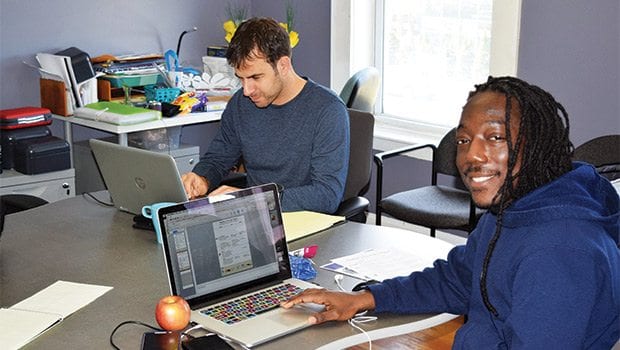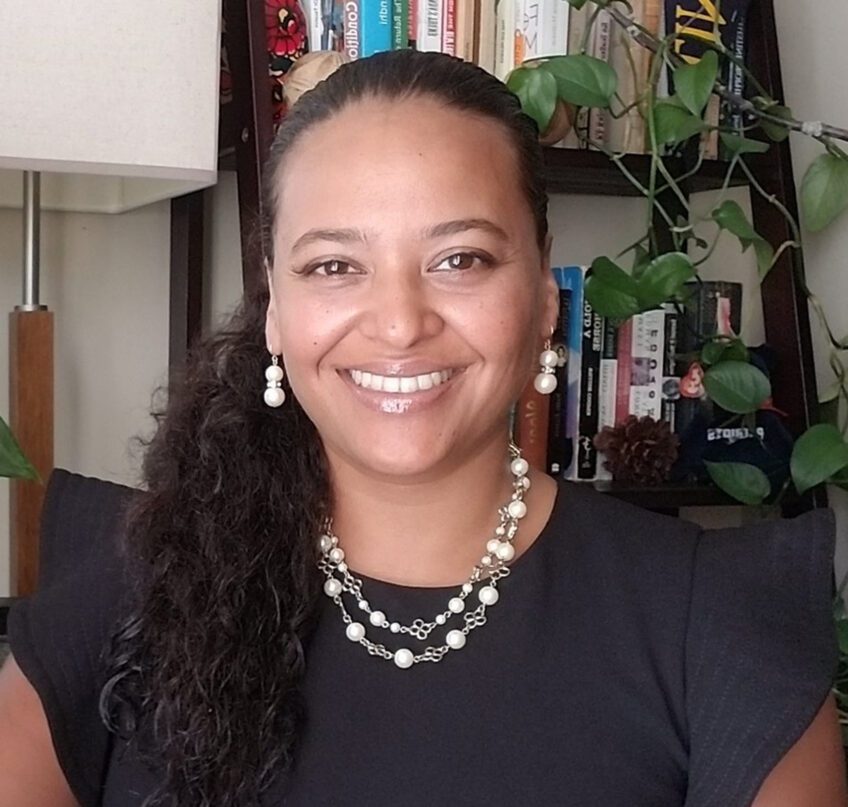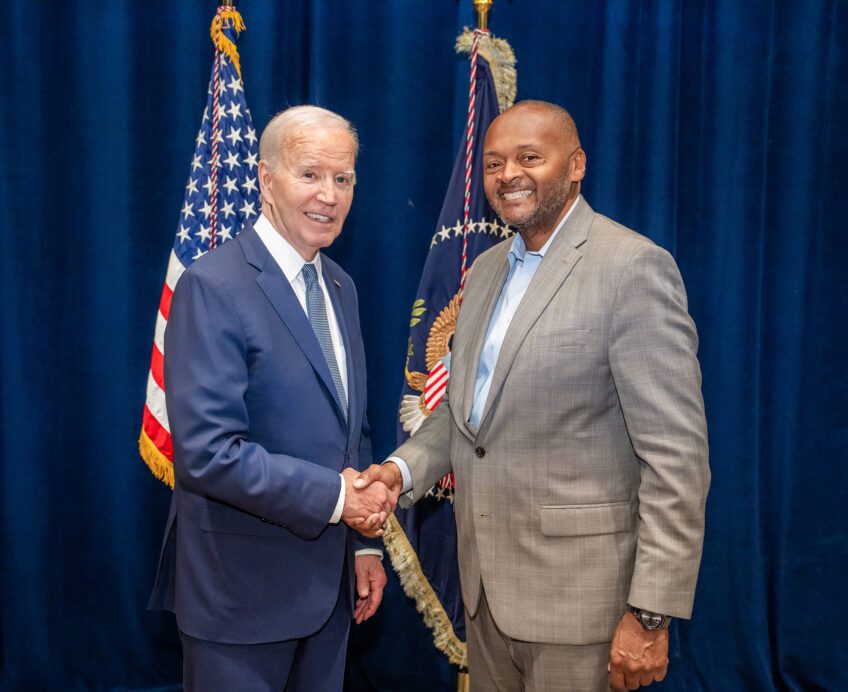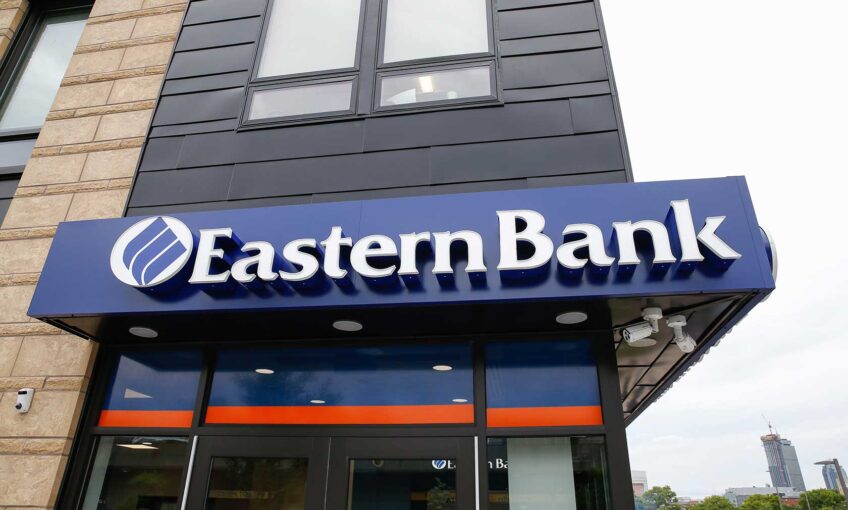
Phil Ellison, co-founder of ULink, a company developing a web-based platform to help students in community colleges transfer to four-year universities, credits Dudley Square-based business accelerator Smarter in the City with helping him turn his business from a dream into reality.
“Smarter in the City was really the opportunity to get recognized for an idea and to work on it and try it out,” said Ellison, a Tufts University student finishing up an undergraduate degree in African studies with a minor in entrepreneurship. “Smarter in the City was the first step for getting recognition and resources.”
ULink and Ellison, along with fellow Tufts student co-founders Parisa Esmaili and Jubril Lawal, are part of Smarter in the City’s recently finished third cohort of startup companies.
Along with entrepreneurs from four other companies, ULink’s founders spent five months at Smarter in the City beginning last September. Smarter in the City provides the entrepreneurs with free office space, shared business amenities — printers, copy machines, kitchens, meeting rooms — as well as access to mentors and a program of business development education that is designed to help develop the startups into viable ventures. The companies are also provided a stipend during the five-month stay at Smarter in the City to allow the entrepreneurs to devote their time and effort to developing their startups.
Accepting applications
Smarter in the City was started in 2014 and has run three cohorts of startups supporting more than a dozen local companies so far. The accelerator has been praised for its efforts to boost the startup economy in Boston’s neighborhoods. Admission to a cohort comes through an application process — now open for the fourth cohort to start in September 2016 — but special attention is paid to entrepreneurs from Roxbury, Dorchester and Mattapan and other city locales.
While traditional Boston innovation hubs such as Kendall Square or the Seaport District always seem to garner the most attention, Smarter in the City was singled out in its first year as one of just 50 business incubators in the country to receive $50,000 from the U.S. Small Business Administration’s Growth Accelerator Fund.
Importantly, for Gilad Rosenzweig, founder and executive director of Smarter in the City, what the business accelerator is doing is helping build a network of local entrepreneurs that want to grow and stay in the neighborhoods they were born out of.
“The ideal success would be a company coming out of Smarter in the City and hiring some tech talent, marketing and sales support, and opening up their office right here in Dudley Square,” Rosenzweig said. “And I think we will have that hopefully with a couple of the companies here now.”
Even though the cohort time runs for five months, it is not like Smarter in the City just drops the companies. Some continue to work in the space and others continue to take advantage of the mentoring and support as they move out on their own.
Just last Thursday night, for example, Smarter in the City held a Roxbury Founders Night at the Roxbury Innovation Center as a way to continue the networking opportunities for all its former startups and also showcase the businesses to the business community at large.
Moving forward
As companies leave a business accelerator like Smarter in the City they may not all be ready to launch their own offices, but the hope is they are closer to that point.
“It doesn’t mean that after six months that business is going to be ready, but we have to make sure they are on the right track,” Rosenzweig said.
Another great development is that time at Smarter in the City prepares a startup to move on to another accelerator or to win business plan competitions and the resulting funding that sometimes accompanies this.
Several Smarter in the City grads have moved on to fellow Boston accelerator MassChallenge, for example.
Just finished cohort member ULink is an example of this. Ellison and his co-founders recently won the Tufts New Ventures Competition, which puts their company in the next MassChallenge class.
ULink does hope to fulfill Rosenzweig’s vision and eventually be headquartered in Roxbury. Ellison has high praise for the experience.
“Smarter in the City has been a great foundation for us,” Ellison said. “It has been a win for us.”
In addition to ULink, Smarter in the City’s third cohort of startups included: BeautyLynk, founded by Rica Elysee; Beldwell, started by Jamila Smith; Haute House University, launched by Taneshia Camillo-Sheffey; and Our Space Our Place, founded by Cheryl Cummings.
BeautyLynk’s Elysee found the collaborative environment at Smarter in the City very helpful for her growth as an entrepreneur.
“The most valuable part of being part of Smarter in the City has been working with other entrepreneurs in the community during our ‘work parties’ where we spend time brainstorming about each of our companies,” Elysee said.
Elysee started BeautyLynk, a marketplace platform that provides at-home, on-demand hair and makeup services, in November 2014. The company has a Cambridge office already and the next step is expansion to additional cities.
According to Elysee, her goal in taking part in Smarter in the City’s cohort was to learn more about efficiently running a company. She is happy with her experience as well.
“I would recommend Smarter in the City to any entrepreneur that needs additional support developing the idea and the plan to be able to launch successfully in the tech space,” she added.
Path to growth
Taneshia Camillo-Sheffey used this past cohort to work on the launch of Haute House University, a subsidiary to her already successful Boston-based The Haute House Design Studio, which she started in 2012. While her existing business is a design studio, Haute House University is online training and consulting service to help fashion industry designers launch their own businesses.
As a fashion veteran, Camillo-Sheffey said she didn’t have the experience and knowledge needed to launch Haute House University as a technology-based service. But Smarter in the City was able to help her do so.
On the web
Smarter in the City cohort application: www.f6s.com/smarterinthecity/apply
She spoke most highly of the one-on-one mentoring she received.
“There were so many mentors that came into to speak with us which was really amazing,” she said. “It was a very valuable experience.”
Our Space Our Place founder Cheryl Cummings has been working on her non-profit program to provide after school and summer technology-backed programming for visually impaired students since 2006, but used Smarter in the City to start a transition to focusing on it full-time.
She values the exposure to other entrepreneurs.
“Smarter in the City has made such a huge difference by providing a place, an actual space, where I can go and work and not be isolated and be part of a group of people who are all sort of moving toward the same thing. We all have different businesses and ideas we are working on, but everybody gets that you are trying to get something up and running and wants to help,” Cummings said. “That has been very exciting.”
Kofi Callender, Smarter in the City’s director of entrepreneurial development, points out that Smarter in the City wants to build excitement for entrepreneurial activity not just with its cohort but with its presence in Dudley Square and its working with organizations such as the Boston Impact Initiative that can connect entrepreneurs to the accelerator even if they are not part of a cohort.
“We strive to be like a hub for companies here,” Callender said. “We really would love to create that atmosphere at Smarter in the City where companies come here to work. This is the energetic place where you come and get a lot of feedback from each other and work with each other and build an entrepreneurial community here in Roxbury.”






